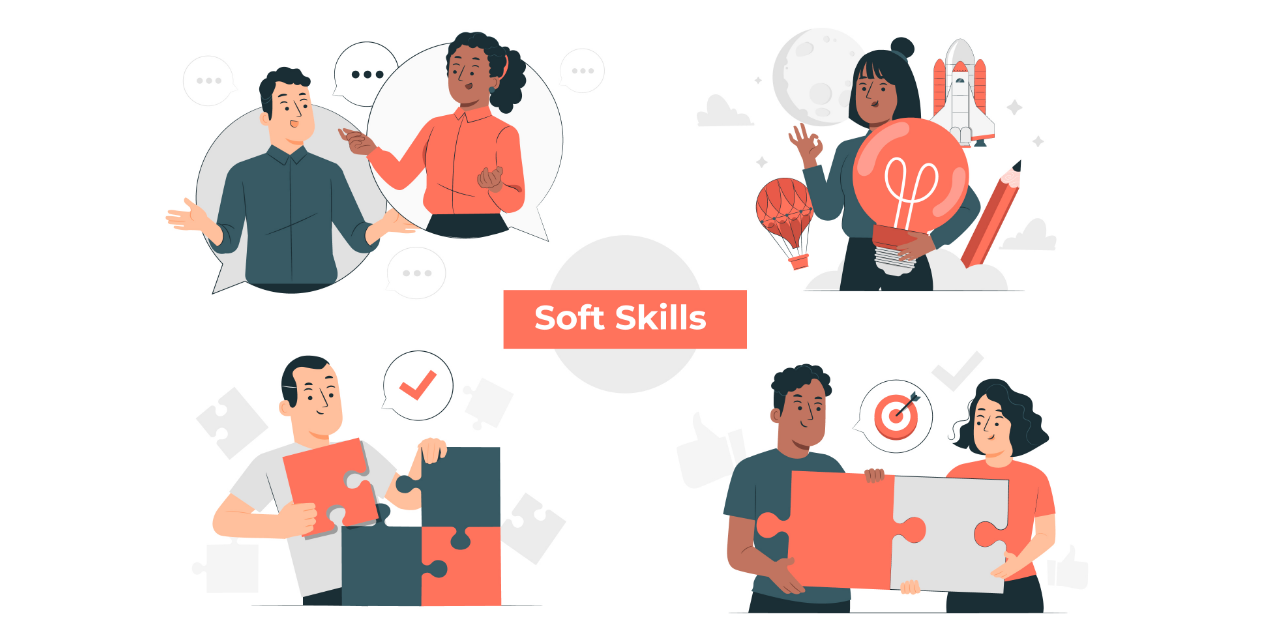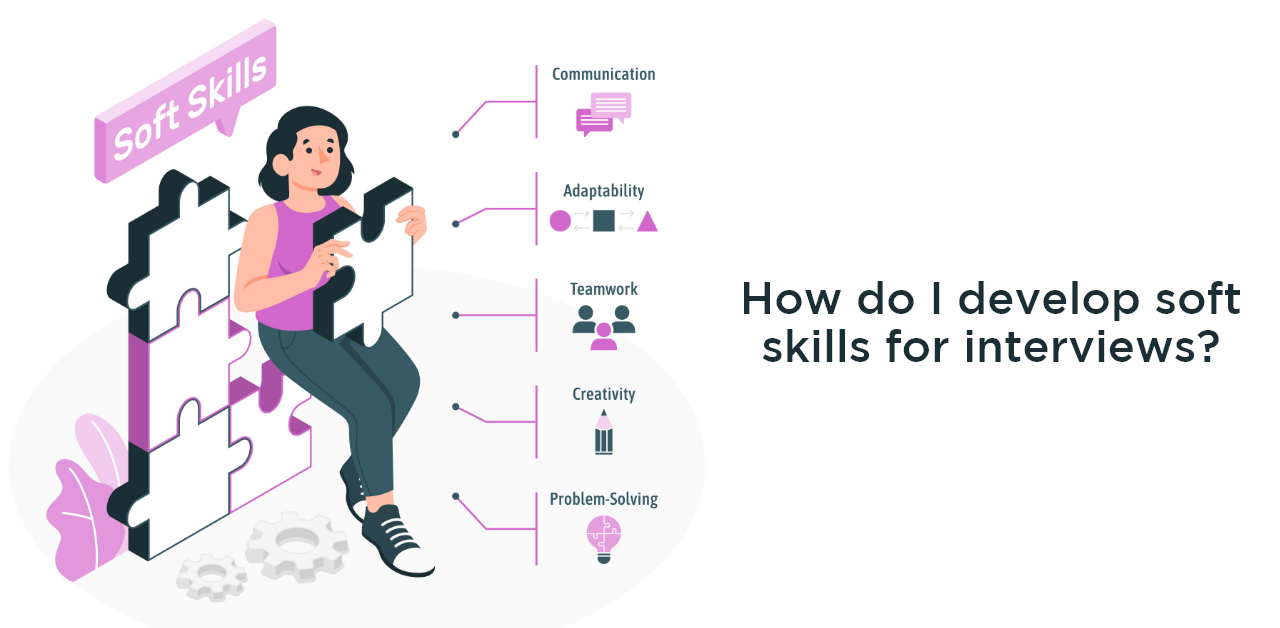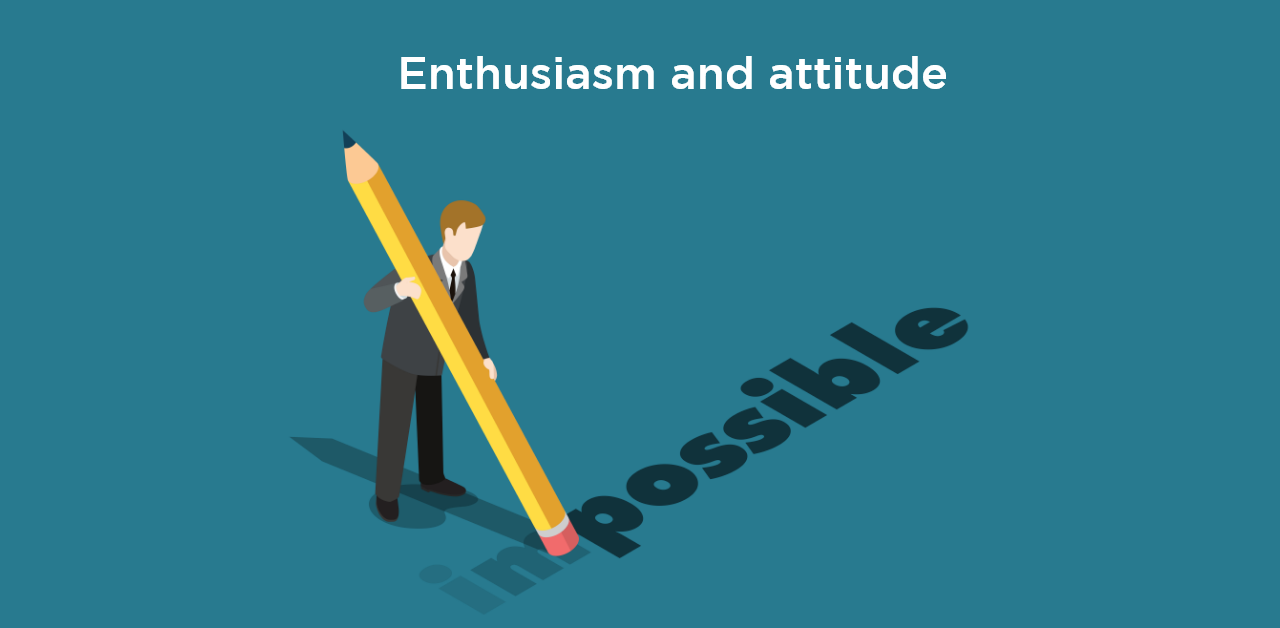The Minimalist Guide to Developing soft skills for Interviews
Posted on December 27, 2022 at 12:33 PM

According to LinkedIn, 92% of hiring managers and talent professionals believe that soft skills are just as essential as hard skills in the recruitment process. 89% claim that lack of proper soft skills is a common factor in a lot of people applying for jobs and sitting for job interviews.
In a different survey, 91% of recruitment experts agreed that soft skills are crucial to the future of hiring and human resources.
By looking at the above facts and figures, it is safe to say that recruiters and interviewers are more likely to assess your soft skills besides asking you their usual interview questions.
Read the blog to develop soft skills and stand out from the rest!
How do I develop soft skills for interviews?

Here, we list a few soft skills and the ways to develop them. Kindly go through them, as giving the best answers to your interview questions and. In our opinion, having the required soft skills is equally important to having professional skills.
1. Nonverbal communication and eye contact
Making appropriate eye contact demonstrates self-assurance and respect. You show that you are focused and paying attention when you maintain eye contact with the person you speak to.
Looking away could give the impression that you are disinterested or inattentive.
Tip for developing this soft skill:
To set yourself apart from the other applicants, pair your focused eye contact with an appropriate facial expression—express interest with a friendly, open face.
Spread out your focus if multiple people are interviewing you. By keeping an eye on each person as you respond, maintain eye contact with the entire interviewing group.
Eye contact must be friendly and appropriate—not a relentless stare. People feel uncomfortable when they are stared at, which happens when eye contact is not desired.
Candidates can listen to recorded mock interviews or practice answering questions in front of a mirror to hone soft skills like eye contact.
2. Level of engagement
Engagement is a crucial component of developing soft skills. Body language is just one way to convey your level of conversational engagement.
Once you are seated for an interview, start by analyzing your body language.
It’s unprofessional to slouch during an interview. Leaning to one side or reclining the interview chair can indicate that you are uninterested or overly relaxed. It demonstrates a lack of respect for the interviewers as well as self-confidence.
Tip for Developing this Soft Skill:
Candidates eager to learn how to develop soft skills like body language can begin by paying attention to their posture. Sit up straight during the interview to demonstrate interest.
A quick and efficient way to focus on and gradually improve your body language is to record a mock interview.
3. Rate and clarity of speech
The speed and clarity of your speech are the two main factors to consider when communicating verbally.
What affects the rate at which you speak?
- Your usual speaking pace.
- Stress and anxiety: Your speech is faster when under pressure.
- Mental fatigue: You speak more slowly when you are tired.
- Complexity of spoken words (longer words require more time to enunciate)
- Pauses in speech
How do I develop this soft skill?
Speaking slowly generally makes for more transparent communication than babbling.
As a result, you should occasionally pause while speaking to allow your interviewer to take everything in and start processing it.
If you have trouble enunciating clearly or speaking too quickly, try recording yourself to work on your pronunciation. You can identify the issues related with clarity of your speech as you listen to your recorded voice. Your interviewer will be able to understand you more clearly as your accent gets better.
4. Filler words
When our mouth and brain need a moment to catch up, we insert filler words into our speech.
The following are some tried-and-tested strategies to help you kick the habit of using filler words:
Raising your level of preparation
Being unprepared makes you feel more anxious. Most people speak more quickly when nervous, which increases the likelihood that your brain won’t be able to keep up.
Try to draft some sample responses to potential interview questions in advance.
Slowing down
Speaking more slowly will help your interviewer understand you better!
Embrace the silent pause
Try to use silence in place of the filler words. You can break this habit if you practice and are dedicated.
These are a few soft skills that you can develop while preparing for your interview. Just as you resort to the internet to find commonly asked interview questions, you should also commit to developing the aforementioned soft skills.
What soft skills do you need to exhibit during a job interview?
There is no denying that answering your interview questions aptly is utterly significant. However, there is more to being an ideal candidate for the job.
There are a few soft skills that a recruiter requires their candidates to possess, and the only time to demonstrate those skills is in an interview.
Therefore, we urge you to showcase the following soft skills during a job interview:
1. Communication

Any role, in some way, requires effective communication. Employers value workers with solid communication skills who can make their points clearly and diplomatically.
Companies are also on the lookout for employees with the ability to effectively communicate with team members who are senior leaders and stakeholders.
In light of this, impressing your interviewer by clearly articulating your points will help you land the job.
Additionally, you can demonstrate that you have strong abilities for two-way communication by actively listening and responding with well-prepared responses.
2. Problem-solving
The ability to think creatively and laterally is a requirement for many jobs. You frequently have to do this independently with little assistance from your peers or manager.
A question about how you handled difficult situations in previous roles, individually and collaboratively, will be asked during an interview.
Therefore, gather numerous examples of your best problem-solving experiences.
3. Leadership and initiative
Contrary to popular belief, leadership abilities can be demonstrated without being in a management position. These abilities can be as simple as speaking up during a meeting to offer ideas, taking the initiative to complete a task, or being the team member others turn to for guidance when things are difficult.
A key component of effective leadership is the capacity for teamwork within a group and the willingness to lend a helping hand when required.
4. Enthusiasm and attitude

Do you know that showing enthusiasm and passion for the position without going overboard in your job interview can help you stand out from the competition?
From the very beginning of the interview process, showing potential employers that you are eager and that, if hired, you will maintain this same level of zeal at work is critical.
You can show that you are an enthusiastic applicant and have the right attitude about this job opportunity by showing up early, participating in the interview by asking questions, and paying close attention to what the interviewer says.
Additional categories of enthusiasm and attitude include:
Culture fit
It differs from organization to organization and is more challenging to acquire or develop.
Be diligent in comprehending the guiding principles that shape a company’s culture, as it helps you decide whether you will be a good fit for the role.
You should deliver your promises on time and go above and beyond for your team.
Emotional intelligence
Your ability to self-regulate, be self-aware, and have empathy are all aspects of emotional intelligence.
If you have high emotional intelligence, your coworkers may find it easier to work with you. It is because you are more understanding of their needs and preferred methods of communication.
Adaptability
This trait is about your flexibility and ability to adapt and change to new situations and circumstances, especially under pressure.
Conclusion
We hope you know the soft skills you must demonstrate while answering your interview questions. You can enroll in an online course, ask a friend to give you feedback, or practice in front of a mirror.
There are several more ways to hone your soft skills.
Therefore, prepare well for your interview questions while devoting a few hours every day to developing soft skills.
If you are interested in technical and nontechnical jobs and interview in Mohali or Chandigarh, consider opting for Relinns Technologies.
Relinns Technologies is a software development company that has proved its mettle and has numerous happy clients globally.
Head to Relinns Technologies to stand a chance to work with us.
Related Posts
We could talk tech all day. But we’d like to do things too,
like everything we’ve been promising out here.

